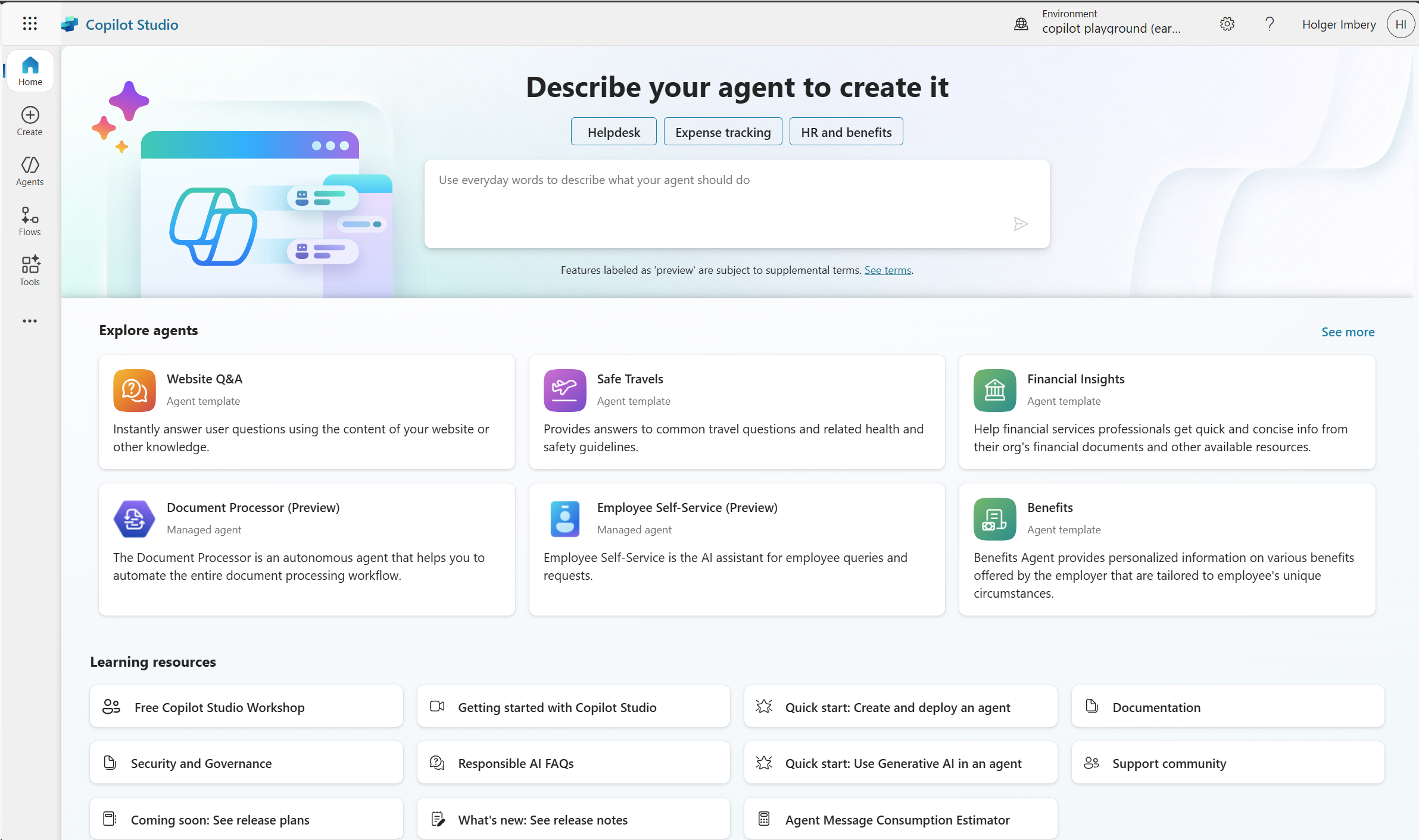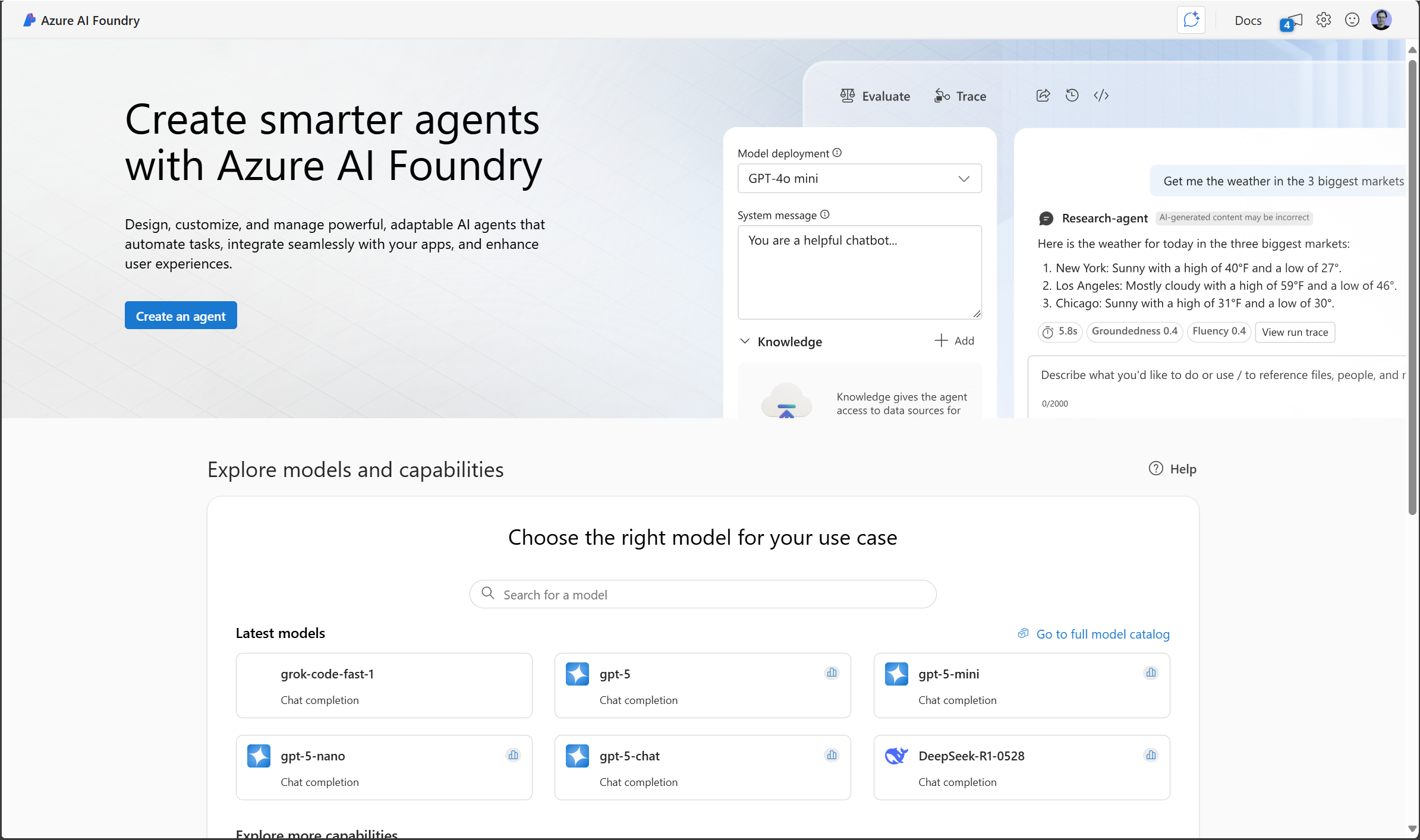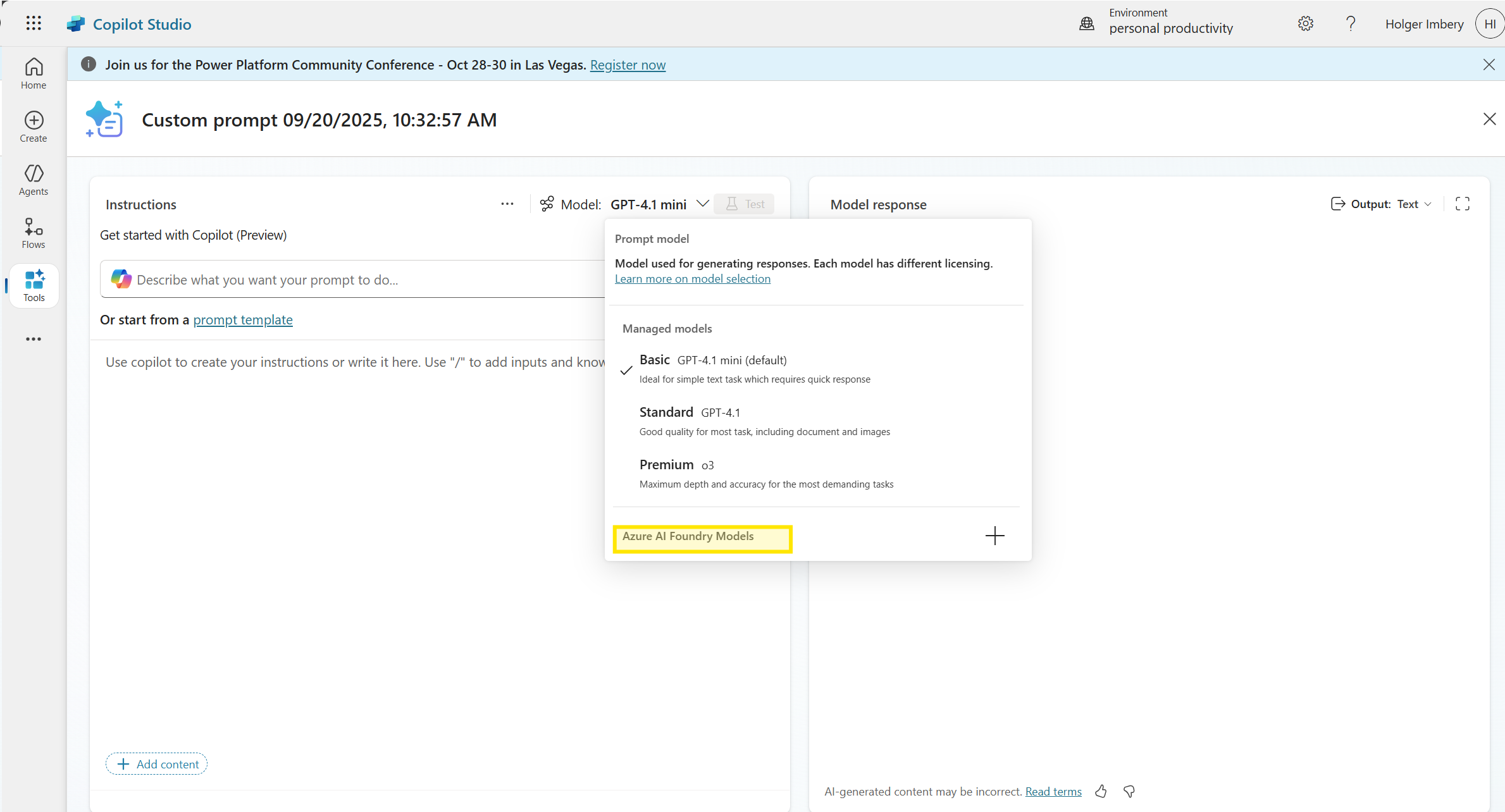Table of Contents
Summary Lede: As enterprises accelerate their AI adoption, Microsoft offers two powerful but distinct platforms: Copilot Studio and Azure AI Foundry. While both enable the creation of intelligent agents, they serve different purposes, audiences, and technical needs. This comprehensive guide compares their capabilities side by side and demonstrates how combining them can deliver transformative business outcomes across customer service, knowledge management, and process automation scenarios.
Choosing Between Microsoft Copilot Studio and Azure AI Foundry: A Comprehensive Guide

Microsoft Copilot Studio is a low‑code platform for designing, testing, and publishing conversational agents tightly integrated with Microsoft 365. Its browser-based visual canvas lets authors compose dialog flows and generate answers, configure data sources, and define actions without extensive coding.
Core capabilities include:
- Native connectors to Microsoft Graph, SharePoint, and Dataverse
- Agent Flow (Power Automate) integration for workflow orchestration
- API- and plugin-based tool calling
- Prompt configuration with grounding to enterprise content
- Built‑in test console and publishing controls for channels such as Teams, Outlook, and web
Enterprise features span:
- Entra ID single sign‑on
- Microsoft 365 DLP and Purview compliance
- Content safety controls
- Conversation transcripts and analytics in Power Platform Admin Center
- Environment‑scoped ALM with solutions
- Role‑based governance
- Audit logging
- Tenant policies for safe rollout

Azure AI Foundry is a code‑first and studio experience for building scalable AI applications and agents with complete control of models, prompts, tools, and data. Its interface combines:
- Web studio with model catalog and playgrounds
- Agent and prompt orchestration graphs
- Evaluation dashboards and traceability
- SDKs, CLI, and VS Code extensions for reproducible development
Core capabilities include:
- Access to frontier and open models with bring‑your‑own-model options
- Fine‑tuning capabilities
- Retrieval‑Augmented Generation using Azure AI Search and vector indexing
- Content safety and grounding
- Tool integration via Azure Functions, Logic Apps, and REST APIs
Enterprise features span:
- Connections to Azure Blob Storage, Data Lake, Fabric, SQL, and Cosmos DB
- Deployment options for web apps, containers, AKS, Functions, and private endpoints
- Azure RBAC, managed identities, and Key Vault–backed secrets
- Private networking and VNet-isolated inference
- Monitoring with Azure Monitor and Application Insights
- CI/CD, evaluation, and A/B testing for robust LLMOps
| Platform | Best For | Key Strengths | Ideal Users |
|---|---|---|---|
| Copilot Studio | Rapid chatbot development for Microsoft 365 | Low-code, fast deployment, Microsoft 365 integration | Business users, IT admins |
| Azure AI Foundry | Scalable, multimodal AI agent development | Full model control, orchestration, enterprise-grade AI | Developers, data scientists |
| Combined Use | End-to-end AI workflows | Seamless integration, advanced reasoning + user-friendly UI | Cross-functional teams |
Recommendation: Use Copilot Studio for front-end user interaction and Azure AI Foundry for backend intelligence, especially in complex enterprise scenarios.
Example in the tool section of copilot studio, while creating a custom ai prompt.

How Copilot Studio and Azure AI Foundry Work Together
Think of Copilot Studio as the “front door” for your users. It provides the chat interface in Teams, Outlook, or on a website. Users type questions or requests there. Azure AI Foundry is the “engine room” behind the scenes. It handles the heavy lifting: advanced reasoning, searching large knowledge bases, and using custom AI models.
Customer Support Chat
A user asks a question in Teams. Copilot Studio captures the question and sends it to a secure API. That API calls Azure AI Foundry, which uses a large language model and your company’s documents to create an accurate answer. The answer is sent back to Copilot Studio and shown to the user in the chat. This simple workflow can be implemented entirely within Copilot Studio for straightforward scenarios but benefits from Azure AI Foundry’s advanced capabilities when dealing with complex queries.
Knowledge Search (RAG)
A user asks, “What is our vacation policy?” Copilot Studio sends the question to a workflow. The workflow searches your company’s documents using Azure AI Search. Foundry combines the search results with the question and generates a precise, grounded answer. Copilot Studio displays the answer with links to the original documents. This simple workflow can be implemented entirely within Copilot Studio for straightforward scenarios but benefits from Azure AI Foundry’s advanced capabilities when dealing with complex queries.
Email Classification
An email arrives in a shared mailbox. A workflow sends the email text to Azure AI Foundry. Foundry classifies it (e.g., HR, Billing, Technical) and drafts a response. The system sends the draft back through Outlook and logs it in your CRM. Copilot Studio can show the classification history to an agent if needed.
Why This Matters
Copilot Studio makes it easy for users to interact without learning new tools. Azure AI Foundry ensures the answers are accurate, secure, and based on your data. Together, they create a system that is easy to use on the surface but very powerful behind the scenes.
Benefits of Combined Use
Using both platforms together unlocks the best of both worlds:
- Seamless User Experience: Copilot Studio provides a polished, user-friendly interface for end-users, while Azure AI Foundry handles complex backend logic and data processing.
- Advanced AI Capabilities: Leverage Azure AI Foundry’s extensive model library and orchestration features to build sophisticated agents that can reason, learn, and adapt.
- Scalability & Flexibility: Azure AI Foundry’s cloud-native architecture ensures scalability for high-demand scenarios, while Copilot Studio’s low-code approach accelerates development cycles.
Business Impact Analysis
With regard to the three scenarios above:
Customer Support Chat
Challenge:
High support costs and inconsistent responses across channels.
Solution:
Copilot Studio provides the chat interface in Teams or on a website, while Azure AI Foundry retrieves accurate answers from internal knowledge bases and applies advanced reasoning.
Impact:
Cost Reduction: 40–60% fewer first-line support tickets by automating common inquiries
Availability: 24/7 multilingual support without adding headcount.
Customer Experience: Faster, consistent answers improve CSAT and reduce churn.
Knowledge Search (RAG)
Challenge:
Employees waste time searching for policies and procedures across multiple systems.
Solution:
Copilot Studio captures the question, while Azure AI Foundry uses Retrieval-Augmented Generation (RAG) to combine search results with generative AI for accurate, cited answers.
Impact:
Productivity: Up to 30% reduction in time spent finding information.
Compliance: Answers are grounded in approved documents, reducing the risk of misinformation.
Adoption: Easy access through Teams or Outlook encourages self-service.
Email Classification and Response Automation
Challenge:
Large volumes of inbound emails (support, HR, procurement) slow response times and increase operational costs.
Solution:
Azure AI Foundry classifies emails and drafts responses; Copilot Studio integrates with Outlook and CRM for delivery and tracking.
Impact:
Efficiency: 70% faster response times through automated triage and drafting.
Accuracy: 90% classification accuracy with feedback loops for continuous improvement.
Governance: Full audit trail for compliance and quality assurance.
Technical Comparison
| Capability | Copilot Studio | Azure AI Foundry |
|---|---|---|
| Interface | Low-code, visual designer | Code-first (SDK, CLI, VS Code) |
| Model Access | Microsoft-hosted LLMs (GPT, Copilot) | 1600+ models (GPT-4o, Llama 3, Mistral, BYOM) |
| Tool Integration | Power Automate, 1000+ connectors | Azure Functions, Logic Apps, REST APIs |
| Data Access | Microsoft Graph, SharePoint, Dataverse | Azure AI Search, Fabric, SQL, Cosmos DB |
| Security | Microsoft 365 DLP, Purview, Entra ID | Azure RBAC, VNETs, Key Vault, Purview |
| Deployment | Teams, Outlook, Web, Mobile | Web apps, APIs, Edge, Containers |
| Monitoring | Power Platform Admin Center | Azure Monitor, Application Insights |
| Compliance | Microsoft 365 compliance center | 100+ certifications (HIPAA, GDPR, ISO) |
Feature Comparison Table
| Layer | Copilot Studio | Azure AI Foundry |
|---|---|---|
| Frontend | Chat UI, Teams, Outlook, Web | — |
| Logic | Workflow orchestration | Agent orchestration, tool calling |
| Intelligence | Basic LLMs, prompt chaining | Fine-tuned LLMs, RAG, multimodal models |
| Data | Microsoft 365, Dataverse | Structured + unstructured enterprise data |
| Security | Microsoft 365 DLP | Azure-native security stack |
| Deployment | Power Platform environments | Azure regions, containers, edge |
| Monitoring | Power Platform Admin Center | Azure Monitor, Application Insights |
Cost Considerations
| Cost Factor | Copilot Studio | Azure AI Foundry |
|---|---|---|
| Licensing | Included in with Copilot for Microsoft 365 or Pay-as-you-go | Pay-as-you-go via Azure subscription |
| Model Usage | credits | Billed per token, model, and compute |
| Storage | Dataverse, SharePoint, etc | Azure Blob, Data Lake, SQL |
| Scaling | Limited by Power Platform quotas | Fully scalable with Azure infrastructure |
| Maintenance | Managed by Microsoft | User-managed (updates, scaling) |
Tip: For high-volume or compute-intensive tasks (e.g., document summarization, image processing), Azure AI Foundry is more cost-efficient and scalable.
Microsoft Resources to Explore
- Copilot Studio Overview
- Azure AI Foundry Docs
- Copilot Studio Pricing
- Azure OpenAI Pricing
- Microsoft Learn: AI Skills
- Microsoft Security & Compliance
Conclusion
Both Microsoft Copilot Studio and Azure AI Foundry are powerful platforms—but they shine in different areas:
- Use Copilot Studio when you need fast, user-friendly conversational agents integrated with Microsoft 365.
- Use Azure AI Foundry when you need deep AI capabilities, custom models, and enterprise-grade orchestration.
- Use both together to build end-to-end intelligent systems that combine ease of use with powerful backend intelligence.
By aligning the right tool with the right task, enterprises can unlock new levels of productivity, automation, and customer satisfaction.





Start the conversation